“Hollow Pursuits”
Written by Sally Caves
Directed by Cliff Bole
Season 3, Episode 21
Production episode 40273-169
Original air date: April 30, 1990
Stardate: 43807.4
Captain’s Log: The scene is Ten-Forward. Lieutenant Reginald Barclay pours himself a drink from a bottle. Guinan cautions him that she doesn’t want any trouble—because where Barclay goes, trouble always follows. La Forge comes into Ten-Forward and demands that Barclay return to duty. Barclay tells him to buzz off, punctuating his point with a hearty shove that sends the chief engineer ass over teakettle. Riker comes over to point out that he’s being insubordinate, and Barclay takes him down, too. Troi watches all this, feeling his confidence and arrogant resolve and is incredibly turned on.
Before he can continue, he’s summoned to a cargo bay—at which point he tells the holodeck to save the program. He reports to the cargo bay, where La Forge is complaining to Riker about how much of a problem Barclay is—he just coasts along, always late, never doing his best work. When Barclay comes in (trying to hide behind containers initially), he is upbraided by both La Forge and Riker.
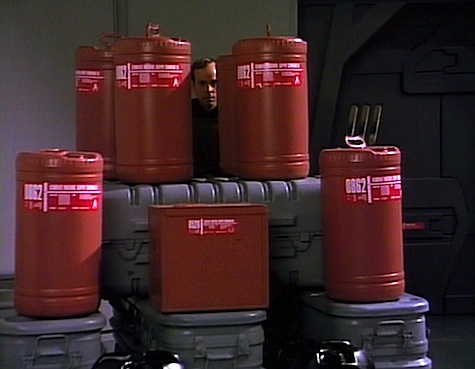
La Forge, O’Brien, and Lieutenant Duffy are working with some medical tissue samples provided by the Mikulax in sealed containers—well, mostly sealed, as Duffy notes that one seal is broken. The anti-grav unit being used to move them around the ship seems to be failing, which Barclay is assigned to fix. After Barclay insists nothing’s wrong with it, the unit fails, knocking yet another container over, breaking its seal. Duffy and O’Brien clean up the container, and Barclay thumphers for a few seconds before finally going to look at the unit.
Riker and La Forge meet with Picard to discuss transferring Barclay off, but Picard refuses to pass the buck. He’s a member of La Forge’s team, so it’s La Forge’s responsibility as his CO to make it work. Picard suggests becoming his best friend, the thought of which sends La Forge screaming from the room (well, okay, only metaphorically), but he gives it a shot, having a pleasant, encouraging chat with Barclay and inviting him to the staff meeting the next morning.
(Picard also learns of the nickname “Broccoli” that Wes started, and which catches on among the crew. Picard orders it to cease, which La Forge later reinforces.)
Barclay shows up on time for the meeting (barely), which also includes Duffy, a few other engineers who don’t have speaking parts, and Wes, who’s putting some time into engineering as part of his endless studies.
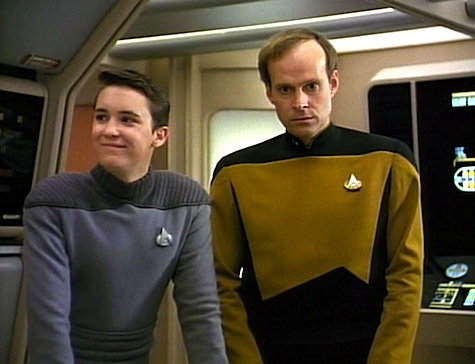
When Barclay reports on the antigrav unit, Wes makes comments and suggestions of his own in his usual snotty-teenager manner. To his credit, Wes realizes his mistake later on in Ten-Forward, but the damage has been done. Barclay retreats to the holodeck again, to have a “counseling” session with his version of Troi—which modulates into Barclay’s “goddess of empathy” program, in which Troi is a love goddess who fulfills Barclay’s every desire.
Things get weird(er) when Duffy’s ale glass springs a leak. There’s nothing wrong with the ale, or with anyone else’s drink, and Data theorizes that the glass may have been exposed to an unshielded power source. It turns out that Barclay was already going to run a test on all four thousand of the Enterprise‘s power systems to see if it could explain the antigrav malfunction, also. (When the gang is reporting this to the captain, Picard accidentally refers to the lieutenant as “Broccoli,” resulting in a moment of major awkwardness.)
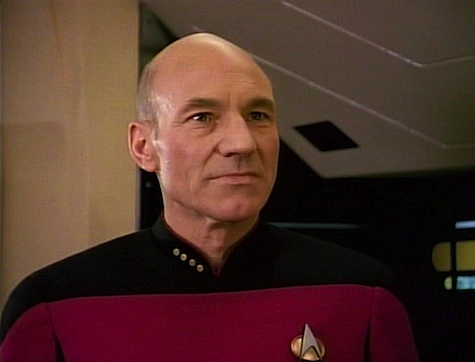
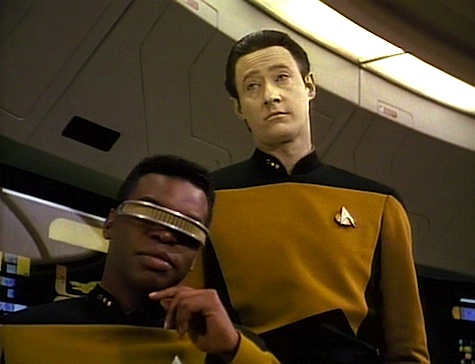
Later on, La Forge seeks out Barclay, finding him on the holodeck—where he’s once again re-created crew members. This time it’s Crusher on a swing, Wes being an obnoxious kid, and Picard, La Forge, and Data as three swordsmen whom Barclay takes on singlehandedly. (Amusingly, most of the serious swordplay shots are distance shots so the stunt doubles can do the work, but there’s one closeup of Picard and Barclay fencing, as Sir Patrick Stewart is the one member of the cast with fencing training.)
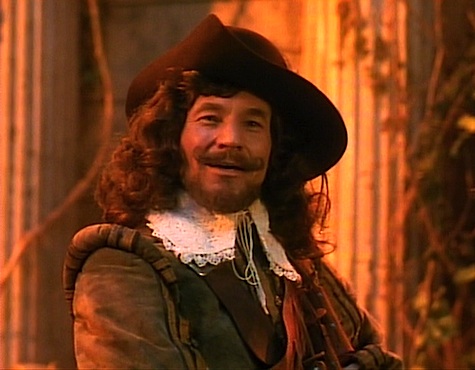
Another malfunction hits in a transporter room, after O’Brien did some maintenance. This becomes a major concern. Riker calls for a meeting on the bridge including Barclay, which La Forge asks to postpone to 1400 so he can have a session with Troi.
Said session doesn’t go so hot, and Barclay runs out of the room the microsecond an opening presents itself. Troi goes to the bridge to talk to La Forge about Barclay, when 1400 comes and goes, and Riker wants to know where Barclay is. The computer reveals that he’s on the holodeck, and Riker, fed up, goes to get him, La Forge and Troi joining him.
The trio get a tour of Barclay’s images of the crew. They are confronted by the Picard/Data/La Forge swordsmen, as well as obnoxious Wes before meeting “Number One,” a short, high-pitched-voice version of Riker. Troi insists that this is a healthy method of escape for someone who has trouble dealing with reality—right up until they come across goddess-of-empathy Troi.
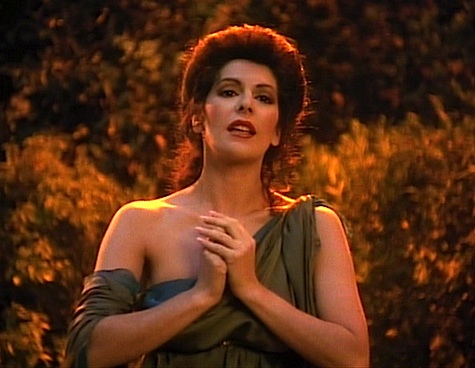
They finally find Barclay, asleep on Crusher’s lap. He’s exhausted himself from all the work.
However, there isn’t time to deal with Barclay’s holographic indiscretions, as there’s yet another malfunction: the antimatter injectors have become locked and the ship is accelerating out of control. La Forge, Wes, Duffy, Barclay, and the guys who don’t have speaking parts all gather ’round in engineering to try to figure out what the problem is, and how to fix it.
It’s Barclay who has the brainstorm: what if it’s one of them? They can’t find a systemic explanation, and the systems don’t interact anyhow. But what if one of them contaminated the systems? It was Duffy’s glass, and he messed with the antimatter injectors—and O’Brien played with the transporter. Wes points out that an internal scan would catch it, but Barclay posits that if it was something they couldn’t scan .
La Forge goes to the computer. What substances can’t be picked up by an internal scan? There are over 15,000 of those. What of those can survive in an oxygen atmosphere? That narrows it down to 500. What of those would alter the molecular structure of glass? Only five.
One has a half-life of fifteen seconds, so it wouldn’t survive long enough to spread around the ship; two more are sufficiently toxic that they’d all be dead. That leaves two others, one of which, invidium, used to be used in medical containment units, though not for over a century. However, the Mikulax might still use it, and one of those seals was broken, and fondled by both Duffy and O’Brien.
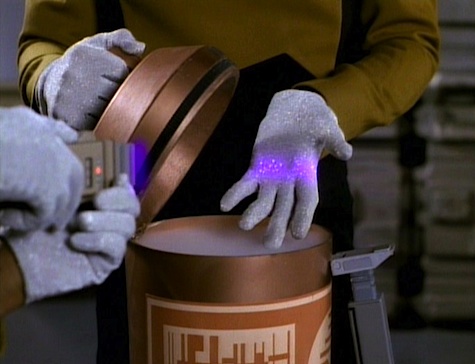
After Barclay and La Forge confirm the invidium, they cool the injectors down to -200 degrees Celsius, which neutralizes the invidium. The ship is saved, and all is right with the world.
On the advice of Troi, Barclay shuts down and erases all his holodeck programs. Except for #9.
Can’t We Just Reverse the Polarity?: We get a whole mess’a technobabble in this one, some real, some not: magnetic capacitors, flow regulators, flow capacitors (which Barclay amusingly later refers to as a “flux capacitor,” since apparently he’s building a time machine), nucleosynthesis, phase transition coils, magnetic quench on the fusion preburners, fuel inlet serves, swirl dampers, gaseous cryonetrium, primary coupling, starboard transfer conduit, ventral relay, and so on.
Thank You, Counselor Obvious: The real Troi tries to help Barclay out, starting with a classic breathing exercise of inhaling through the nose and exhaling through the mouth. That actually works, by the way. Of course, it was only meant as a starting point, but it gave Barclay the opening he needed to scamper away from having a conversation with a woman he’s had sexual fantasies about.
The goddess-of-empathy Troi is a fantastic sendup of the counselor, spouting all kinds of nonsense about casting off masks and such.
If I Only Had a Brain : Data’s role in the episode proper is fairly standard, but Brent Spiner throws himself into the part of swordsman with a delightfully manic glee. He also looks frighteningly like a Guy Fawkes mask…
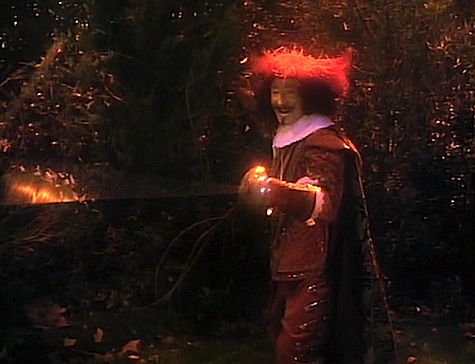
There is No Honor in Being Pummeled: Worf is the one regular cast member we don’t see a version of on the holodeck (except in the final goodbye scene on the “bridge”), which is kind of unfortunate—though also probably better for Barclay’s continued good health, as the real Worf’s response to that would probably be less measured than that of La Forge, Troi, and Riker….
The Boy!?: Wes comes up with the “Broccoli” nickname that later gets Picard in trouble, and Barclay’s response is to make his holographic version of Wes a replica of Thomas Gainesborough’s “The Blue Boy.”
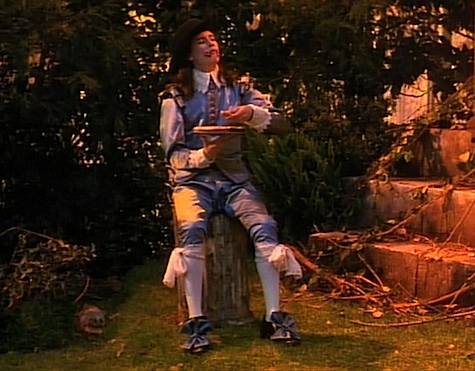
No Sex, Please, We’re Starfleet: Where Barclay re-creates the male members of the crew as adversaries to fight (or figures to be mocked and disdained), he sexualizes the women, turning Troi into someone who wants sex with Barclay at all costs, and Crusher into a beautiful woman into whose lap he happily falls asleep. (Honestly, Crusher is sexier in her amazing dress than Troi is in the goddess of empathy toga.)
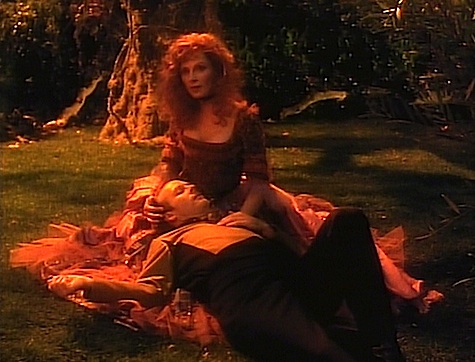
Syntheholics Anonymous: Guinan provides some useful insight on Barclay to La Forge, talking about Turkim, a family member who was somewhat ostracized. But Guinan was drawn to him because she never liked the idea of fitting in. Her advice helps, especially after La Forge discovers Barclay’s holodeck program.
What Happens on the Holodeck Stays on the Holodeck: Speaking of which, this episode sets a really dreadful precedent. La Forge just walks in on Barclay’s program, intruding on his privacy and, to my mind, violating his basic rights. Later on, when Riker, Troi, and La Forge go in, that’s fine, as Barclay’s supposed to be on the bridge and hasn’t reported, so his duty to Starfleet overrides his privacy, but earlier? La Forge had no business going into the holodeck then, especially since he later tells Barclay that what goes on in the holodeck is his own business.
I Believe I Said That: “Why is Lieutenant Barclay being referred to clandestinely as a vegetable?”
Data, inquiring about the “Broccoli” nickname. It’s only after Data asks that question that La Forge remembers to enforce Picard’s request that the nickname cease.
Welcome Aboard: Charley Lang does a nice job as Duffy, that extra speaking part helping create the impression of a larger staff beyond the regulars (La Forge and Wes) and the guest-star-of-the-week (Barclay), and more generally reminding the audience that there are a thousand people on board.
But of course this episode is best remembered as the introduction of Reginald Barclay, who would continue to recur on both TNG and Voyager, appear in the movie First Contact, and also be mentioned on both Deep Space Nine and Enterprise. Dwight Schultz is simply fantastic in the part, convincingly showing the depths of Barclay’s neuroses without ever crossing over into stereotypical parody. It would have been easy to make him a caricature, but at no point does Barclay ever feel anything other than real, whether he’s stammering through a report or pretending to be a badass on the holodeck or gravely saying to La Forge, “‘Just shy’—sounds like nothing serious, doesn’t it?”
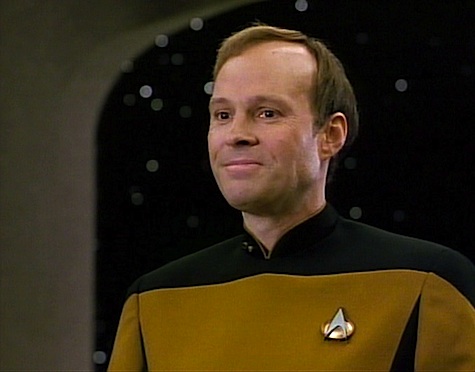
Trivial Matters: Schultz appeared with Whoopi Goldberg in the movie The Long Walk Home, and he told her how much of a Star Trek fan he was, leading to Goldberg petitioning Rick Berman to find a part for him.
In addition to continuing to appear onscreen, Barclay has appeared in plenty of works of tie-in fiction; the full list is too numerous, but a few of note include Gemworld Books 1-2 by John Vornholt, Full Circle and its post-finale Voyager sequels by Kirsten Beyer, Indistinguishable from Magic by David A. McIntee, and the short stories “The Naked Truth” by Jerry M. Wolfe in Strange New Worlds and “Thinking of You” by Greg Cox in The Sky’s the Limit.
Barclay isn’t the only recurring engineer to debut in this episode: Duffy would be given the first name of Kieran and made a regular in the Starfleet Corps of Engineers series, as the second-in-command of the S.C.E. team aboard the U.S.S. da Vinci. Of particular note are the stories Interphase by Dayton Ward & Kevin Dilmore, Wildfire by David Mack, your humble rewatcher’s own Many Splendors, and “Field Expediency” by Ward & Dilmore in Tales of the Dominion War.
La Forge twice makes references to his dalliance with the holographic Leah Brahms in “Booby Trap.”
Make it So: “Poor Broccoli.” This episode got mixed responses when it aired 20 years ago, as many of the nerdier Star Trek fans viewed it as a satire of, well, them. Both director Cliff Bole and executive producer Michael Piller deny it—Piller went so far as to say that Barclay was a pretty good analogue for Piller himself, he was just lucky enough to get paid for his wild imaginings—but those denials are a bit disingenuous. Yes, Barclay is a fairly standard recluse, painfully shy, but the Venn diagram of that and the stereotypical Trek fan has significant overlap.
The thing is, it doesn’t matter, because the episode never once makes fun of Barclay or makes him ridiculous. In the end, he even saves the ship!
In many ways, the episode’s ahead of its time. Every third show on TV now has at least one geek character—not to mention the fact that The Big Bang Theory is one of the most popular sitcoms on the air. Honestly, Reg Barclay pretty much is Raj Koothrappali…
This episode works on pretty much every level. Besides the introduction and development of a character outside the normal idealized humans we tend to see on Trek (particularly on TNG), we also get a fun little puzzle, some hilarious holodeck scenes (every actors chews all over their holo-roles with gusto, with Sir Patrick Stewart, Jonathan Frakes, and Wil Wheaton particularly standing out—the latter provides a nice prelude to his current recurring roles on both Leverage and Eureka with his Blue Boy Wes), and some good advice from Guinan to La Forge while wearing a yellow outfit that’s hideous even by Guinan’s low standards.
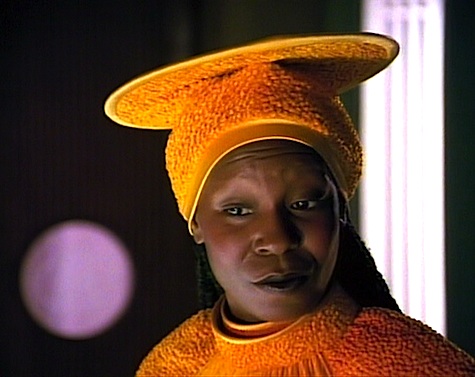
Best of all is the fact that the solution to the problem is a team effort. While the initial inspiration of “What if one of us is the problem?” is Barclay’s, the solution is arrived at thanks to the contributions of La Forge, Barclay, Wes, and Duffy. Just great stuff.
Warp factor rating: 8
Keith R.A. DeCandido is working right now on Goblin Precinct, the sequel to his high fantasy police procedurals Dragon Precinct and Unicorn Precinct. The book should be out this spring from Dark Quest Books if all goes according to plan. Go to Keith’s web site for info on his latest works, as well as links to his blog, his podcasts, his Facebook and Twitter, and lots more.










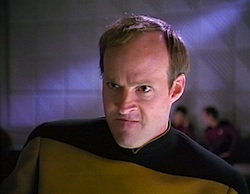
Always loved this episode. I, too, like that the problem they are faced with required a team effort to deduce and solve.
Also, Wil Wheaton’s piehole-filled delivery of the line, “What do you want?” is priceless…
Always found the Barclay episodes hard to watch. He’s well written, however, and is one of the more well developed characters in the series; particularly if you add in his appearances on Voyager.
I thought it was a nice piece of irony that Wes was the one who gave Barclay the mocking nickname. A little nerd on nerd crime, there. Kinda shows that we can all be cruel, even if we’ve been the object of such cruelty.
I did find the holodeck scene terribly funny & definitely think that more often than not crew members use it just as Barclay did. ;-)
Kato
Great rewatch, as usual. But how did “He’s the bravest warrior…on all the holodeck” miss I Believe I Said That? : )
Pillar and Bole’s denials seem especially disingenious when one remembers that a producer of “Nemesis” explained that film’s less enthusiastic reception this way: “It’s a date movie, and many Star Trek fans can’t get dates.” Nice!
That aside, I remember enjoying the episode. I agree with the 8 rating. It does what the holodeck does best, which is allow the show to pretend it’s something other than “Trek” for a while. And not only are the representations delightful, but so are the real crewmates’ reactions. (I still remember Troi’s “muzzle it!” to her counterpart.) It makes us realize how awkward it would be to know another person’s fantasies, especially if we were in them.
Geordi sure is a hypocrite!–though perhaps that’s actually why he finds Barclay irksome: maybe he sees a bit of himself?
“Pillar and Bole’s denials seem especially disingenious when one
remembers that a producer of “Nemesis” explained that film’s less
enthusiastic reception this way: “It’s a date movie, and many Star Trek
fans can’t get dates.”
CORRECTION: It was “Insurrection,” not “Nemesis.” Apologies.
Never liked Barkey or the halodeck for that matter. I guess they had to show not everybody is a good offcier but my god. they basicly see him masterbating to pictures of crewmates on duty. I think i’m supposed feel sympathy but I just don’t like him enough.
I’m utterly thankful for this episode not for introducing the character of Barclay, but also for that intro of Duffy, who’s had one of the better storyarcs in all of Trek EU Fiction. SCE is one of my favorite Series, and it is such a shame the series is no longer being written for regularly. Duffy was more or less the antithesis of Barclay somewhat: gregarious, a practical joker, but also an excellent commanding officer, and frankly an extremely brave man (see the book SCE: Wildfire, amazing stuff).
I find certain people sometimes have a difficut time with Barclay as a character. Some love him, some detest that someone like that would be able to get that far in Starfleet at all without being busted down to midshipman. I, as a fan of things like “Lower Decks” and SCE, find him to be a bit refreshing; a normal guy, who has his issues/nerouses, but also tries to do the best work that he can when not plagued by the aforementioned problems.
A friend of mine gets the same feeling espoused here in the “he is me” category, but it is a bit closer to home. He told me one time that his favorite character was Barclay, and I asked why (as he had all of Trek to pick from). His response was that Barclay was the closest person he could relate to, as he suffers from depression, and in choosing not to take heavy medication for it, relies on a support structure of friends and family. My friend is also an introvert, and has had relapses (much like Barclay), but his support has always been able to draw him out of it. In my mind, whereas Trek has always shown that it has medicines beyond out technology, that even in the future not everybody has the same brain chemical balance, and certain issues of mental health do crop up. In essence: Nobody’s perfect.
We see a bit more of that aspect in DS9 (O’Brien close to Suicide in “Hard Time”, Bashir’s struggle with his Genetic Alteration and the other Augments) , and somewhat in Voyager (Torres’ anger issues, Chakotay’s depression in The Voyager Relaunch novels), but none as well illustrated as Barclay.
This episode makes me wish there had been a Star Trek spin-off novel titled “I, Barclay.” (It’s not too late, is it????)
This episode is more humorous than the previous “Captain’s Holiday,” but it’s not a completely funny episode…glad they were able to mix the two.
I wonder about the blatant negativity the crew gives to Barclay about his ‘holoaddiction.’ If holodecks existed in 2012, I’m sure it’d be a much more rapant social disease than what the crew lets on. Granted, this is supposed to be the 24th century, but still! Humans are easily distracted and love to create their own ideas of ‘paradise’….and if you could do that in a room for endless hours, how many people would say no? Especially if it was a few doors down from your workplace? To me, it almost seems like the crew would chastise Barclay for watching too much TV, and if that happened at work, how many of us would go, “Wait–What?!” Would it be wrong because everyone does it?
Can’t wait for “Nth Degree.”
JYHASH: Thanks for the kinds words about S.C.E. I remain inordinately proud of that series as both its editor and one of its writers, and it was tremendous fun to expand out on the characters like Gomez, Duffy, and Lense whom we only saw for one episode.
—Keith R.A. DeCandido
I’ve always had mixed feelings about “Hollow Pursuits.” Barclay is a fun character, and one I can identify with. I did feel Dwight Schultz played him somewhat too broadly, but then, he plays everyone broadly. (I invite the readers of this post to compare any given Schultz performance — other than Murdock — to any given William Shatner performance. I find they have uncannily similar acting styles and speech rhythms, and I’ve often wondered if Schultz deliberately modeled his style on Shatner’s.) The holodeck sequences were fun, mainly due to Dennis McCarthy’s fantastic score — this was one of those rare occasions where he was allowed to be melodic and expressive with his music, and his “Goddess of Empathy” motif for holo-Troi is absolutely gorgeous.
And yet the episode never really came together for me. Okay, so all this character stuff about Barclay and the crew is set up in the first half, and then there’s a technobabble crisis that Barclay plays a minor role in resolving, and then it just kind of fizzles out. I guess I can see what they were going for, that Barclay overcame his isolation enough — and the crew overcame their preconceptions of him enough — that he was able to become part of the team and didn’t need his illusions so much. But the execution felt fragmented to me. I always felt I was missing something, or rather, that the episode was missing some pieces. Maybe it’s that they set up Barclay’s holodeck problem as a literal addiction and then had him overcome it so easily that it was almost an afterthought. That’s sending mixed messages.
Plus it has a credibility problem arising from the need to focus on the regulars. Barclay, at this point, was a minor member of the “lower-decks” engineering crew. He’d probably had very little interaction with the command crew of this vast, populous starship. It seems that it would’ve been more realistic for his fantasies to revolve around his fellow engineers and junior officers, the people he actually knew and interacted with on a regular basis.
And speaking of the junior engineers seen in this episode — why were they all men?
I don’t remember the episode too well, but I remember having mixed feelings about it at the time. “Sally Caves” is the pseudonym of Sarah Higley, a professor at the University of Rochester. There was a very interesting interview with her in the campus paper at the time, that talked about her desire to explore the consequences of getting addicted to virtual reality. She also noted that the invidium plot was arbitrarily tacked on to create the “danger” element. By the end of the story Barclay gets accepted by the crew for solving one problem, and miraculously is cured of his little problem, but wasn’t he supposed to be a brilliant diagnostic engineer (or was that a later retcon?). Has he never fixed a problem before? And I can sure tell you that making a new friend or two does not instantly wipe out all the hurts and hangups in your life that drove you to bad habits in the first place.
I also think Barclay was ill-used by later writers. I suppose anyone could develop holoaddiction after being on the ship for awhile, but how the heck did he even get admitted to Starfleet? Poor Wes keeps failing his entrance exams (and really, one slot for 4 applicants in a multi-million person organization?) but Barclay is not only socially maladjusted, but a hypochondriac and terrified of the transporter — not just annoyed by it like McCoy, but deep-down terrified. Oh please.
I love thinking about these old shows pre-internet, when collective opinions weren’t simplified by being thoroughly aggregated. No one in my geeky circle got the “Barclay’s a parody,” memo. Most people thought he was some sort of extremely well written Mary Sue. No one was insulted by him, though some thought the story a bit pandering. I liked Barclay. I especially liked how he grew over time.
I keep hearing the A Team theme in my head.
@Balance – yep, and another trivial matter: In the A Team movie, when the team is about to break Murdoch out of the looney bin, they send in a movie of a humvee driving toward the screen, and the opening credits have “Reginald Barkley” , along with “G.F. Starbuck” listed as actors…
I loved this episode. The holodeck was well written and funny. Many of my co-workers past and present; and myself included, have parts of Barclay personality in ourselves. And we learn to laugh with our own awkwardness. :)
I love the full name Sarah Higley gave for Barclay, Endicott Reginald Barclay III. Has a full name for him ever been used in a story?
I did some soul-searching in my diary after this episode. (Huh. April 1990. I had *just* started a diary, though I called it my “log” to sound more military. (And maybe I thought calling it “Captain’s Log” was presumptuous. Heh.)) Hello, awkward high schooler, though being on my high school paper by then was making me less awkward. I sometimes got a little defensive about this episode, too; I understood enough about where Barclay was coming from, though I don’t have the kind of addiction issues he did. He didn’t read to me as a parody, and I think that was good. And I’m glad so many other writers were compelled to use him.
I really enjoy when we see other crew members who speak beyond just the core command crew. I understand that they are the regular cast members, that you actually have to pay actors to speak, but its a crew of 1000+ that runs three shifts a day. I find it hard to believe that everything interesting happens on Alpha shift when the command crew is working. Seriously- isn’t there some Lt. Commander who gets to sit in the big chair between Midnight and whenever Sir Patrick decides to roll on the bridge that has interesting things happen to him? Lt. Barclay at least lets us see one of the less glamorous people on board.
Also, I think most people would probably use the holodeck the way Barclay does though- fantasy escapes. Think about it- if we could jump into an episode of ST: TNG would we be the random red shirt floating around waiting to be shot, or would we be the hero? We’ve seen similar things in other sci-fi shows, such as V-World in Caprica.
Speaking of fantasies, I have to disagree with Christopher Bennett on who he fantasizes about. The 1000 or so people on board is much smaller than a lot of high schools, and if I could create a fantasy world of people I wanted to beat up from my high school, I think the captain of the football team and the student body president would be up there. There are just some people that everyone knows in a community that big. It would make perfect sense for Barclay to want to better the best on board, so naturally he’d want to prove himself against the (straw-man) high and mighty captain, his running budy XO, the supercomputer android, and the priviliged rich kid (Wes) and want to get the head cheerleader (Troi) and the hottest teacher (Beverly). After all, if you’re going to be superior, why beat up the captain of the chess and science clubs?
But I do agree with him- why are all the engineers male? In this idealized perfect society 24th century do we still have problems getting women into the math and science field? In fact, once Yar was killed off, there isn’t another female cast member in a technical field (that shows up more than once or twice) until Ensign Ro. Think about how revolutionary (and a bit controversial) it was the the captain of Voyager was a woman. Since we seem to have come past discrimination by this point, shouldn’t we have seen a few female command officers on board?
I love Barclay so much my Alpha Fleet Roleplaying Character nearly got kicked out of Starfleet Academy due to her Barclay’s Syndrome. She was always in the holodeck.
I like this episode a lot, and am a fan of Reg, but one thing I have discussed with my cohost on our podcast (of which the humble rewatcher has been a guest!) is: how the hell did Reg make it through the Academy? I am sorry, someone with his issues would not make it through west Point, so I fand it very hard to believe he would make it through SFA.
Just a thought.
Nick
Gettysburg7 of The G and T Show http://www.gandtshow.com
Fun episode. I’d wondered at the time how long it would take someone to use the holodeck for sexual fantasy involving people they know… And sure enough they did it, without it being lewd or non-TV friendly.
I’d always wondered how Starfleet hired someone like Barclay at all… You’d think he wouldn’t get past any number of psychological Academy tests.
On the question of how Barclay made it through the Academy, I kinda figured that his holo-addiction and other problems didn’t really manifest until he was actually out there and facing the stress of active duty. The Academy is about preparing you for those stresses, sure, but it’s kind of a simulation rather than the real thing, so Barclay may have felt a lot more comfortable there.
@17: Okay, maybe that’s true that it’s plausible that any given junior crewmember might build fantasies around the important people, the command crew. But I’d think that at least some of the other people he interacted with should’ve also been included alongside the main characters. And I just think it was a missed opportunity (though I understand why it wasn’t done) to show us more of how the other half lives, how the junior officers experience life aboard the ship. Luckily, we eventually did get that sort of thing in “Lower Decks,” where the focus was on a whole group of junior officers and the command crew remained mostly in the background.
I never had any trouble believing that someone like Barclay would make it through Starfleet Academy. There are all sorts of accomplished people in real life who have serious addictions and/or mental illnesses; Barclay’s just socially awkward by comparison.
I never saw this one as making fun of Star Trek fans.
I saw it as more towards ripping away the myth of 24th Century Human Perfection, something the series would continue to explore in episodes like Suddenly Human and the like. Not in the form of cardboard villains or ridiculous 20th century stereotypes. But flawed, imperfect, foolish, brave, quirky, ultimately sympathetic and endearing humans.
I loved it.
It is a little strange that La Forge just intrudes on Barclay’s program, but then again, they don’t seem to have patient confidentiality either. Troi comes to find Geordi to tell him about her session with Barclay. There are also other episodes where the doctor’s routinely discuss patient information with others.
From Lee Shackleford:
Keith, I just rewatched this episode myself. I wanted to ask you, when you watched the final scene when Barclay tells the computer to erase all but one of his programs… as soon as he fnishes speaking there’s a musical cue, as he turns to exit the holodeck. Did you happen to catch it? I played it three times to make sure I heard it right…. I *think* it’s the opening notes of “The Minstrel Boy”, the same song O’Brien sings on-camera in the next season! Am I hearing that right? If I am, I am wondering why that musical selection was chosen for that moment in this episode…
@18 So I generally try not to be the ‘actually’ guy…but I’m totally going to be the ‘actually’ guy right now.
Actually, Barclay’s Syndrome had nothing to do with Holo-addiction. It’s full name, Barclay’s Protomorphosis Syndrome was an artificial genetic disease that Doctor Crusher accidentally created while trying to cure Lt. Barclay of the Urdolean flu. Doctor Crusher used synthetic T-cells to activate one of Barclay’s dormant genes to fight off the flu.
But, Barclay’s genetic structure had an anomaly in it which interacted with the synthetic T-cells and activated ALL of his dormant genes. The mutated T-cells then combined with the Urdolean flu and became airborne. Barclay and other members of the crew began to physically mutate either into a previous form of their respective species, or into a combination of animal forms from their planet.
Since Barclay was patient zero for the syndrome, he got the dubious honor of having it named after him. (See TNG: “Genesis”)
Rewatching now, one of the most fun things is when people you recognise pop up who you wouldn’t have known first time round. Dwight Schultz was obviously already well known, so the most fun for me in this episode was seeing that Congressman Skinner from the West Wing once worked in engineering on the Enterprise!
Hi. I started to watch TNG for the first time (!!!!!) a month ago, because I couldn’t back then, and I thought these are the perfect times for escapist entertainment. Anyway, this is my favourite episode so far… because it takes a step backwards and lets us see how the rest of the crew see the main characters. Barclay has its problems, but when the episode focus on him we realize that LaForge is a bit hipocritical, that Riker is abusive with lower ranks, that Troi is, well, mostly useless… but above it all, the episode telling about the sexual fantasies of one of the crew, tells that this TNG crew are absolutely unhuman, cold, and impossible to relate to. Barclay’s behaviour is the most logical human behaviour I’ve seen in the series so far, and his interaction with the rest of the main crew has made the crew a bit more human.
The ending was wonderful.
Risingson…clearly someone isvwatching bbca right now, too :)
Remeber we’re seeing things abit thru Barkley’s pov. We see other times that Riker is an extreemly popular CO with the crew. He comes down on Reg, butnhe pretty much deserves it. I think this episode is fascinating in part due to seeing the ship act like a military ship, with ranks, reviews, and such.
Another back-to-back favorite episode from a season with quite a few back-to-back favorites for me ( “Evolution”, then “The Survivors”, “The Vengeance Factor”, then “The Defector”, “Yesterday’s Enterprise”, then “The Offspring”, and “Tin Man” then this one.) I enjoyed it as a kid and even more so now. Whether or not is was a caricature of the stereotypical Trek fan was and is completely irrelevant, because as Keith points out, Barclay is never made fun of and even helps save the ship. Besides, even it does make fun of Trek fans, so what? I could laugh (at least somewhat) at my social awkwardness as a kid and can most definitely do so now. You have to laugh at yourself from time to time.
More importantly, Dwight Schultz is wonderful as always. I was a fan of The A-Team and loved Schultz as Howlin’ Mad Murdock, and loved him even more as Reginald Barclay. Here was a character on Star Trek who wasn’t perfect, suave, or a genius. Just a regular guy with regular neuroses (who doesn’t have some form of neurosis, really, especially among us in the Trek community?) I enjoy this one each and every time I watch it, in a nutshell because Barclay is outside the 24th century perfect person norm (which appealed to me in Tam Elbrum in the previous episode.) Just an hour of fun, and again I agree with the 8 rating. (We’re actually starting to agree on things, Keith. Now I’m worried :))
@21 So, you wanted alternate holographic versions of characters we didn’t know (Barclay’s peers)?
@Risington
Honey, please, please, when you express your own personal opinion, do not use the word “we”. Seriously. It destroys any bit of consideration or openmindedness a person with a different opinion than yours might have towards your opinion.
i actually thought the second violation of privacy (with geordi, will, and troi) was worse than the first one, because they could have just told the computer to end program and found him instantly without violating his privacy, instead of snooping all through his holodec program looking for him.
It’s a bit disconcerting how often the Enterprise nearly blows up from some warp core overload or some such other thing, due to some relatively innocuous cause. After watching this I was reminded of the scene in Galaxy Quest where Nesmith and DiMarco press the button with plenty of time to spare, only to see it count down to one. “It always stops at one on the show….”
I guess I really don’t understand the love for this one. It’s pretty obvious that Barclay suffers from social anxiety disorder, so I find it pretty ridiculous that they allow him to continue to exist in this state of mind. His work is obviously affected by his condition and considering we can treat SAD very effectively in the 20th-21st centuries, why isn’t he medicated?
Also, I find it highly unlikely that a junior engineer would express his holodeck fantasies with ONLY the regular cast members. You’d think there would be other crew members in his fantasies.
This episode strengthens my opinion that Geordi Laforge is nothing but a big jerk. And on a final note, the stunt double for Dwight Schultz during the sword fights is so bad it is distracting.
Sorry, this one is a big flop – Warp Factor 4.
I could have sworn Guinan’s outfit was orange. :S
Dwight Schultz is amazing, Barclay is too. :P
The bit with Troi telling her holographic counterpart to muzzle it is my favourite bit I’d have to say.
About how in the heck Barclay could make it/stay in Starfleet it’s possible for it to be policial. “This is Admiral Rygard’s nephew. He aint much, but dammit you’d better be nice to him…”
While I’m fond of this episode for many of the reasons stated so far, I also have to echo @36 — don’t they have SSRIs in the 24th century?
@@@@@Jackalson (#33) No, his use of “we” is perfectly colloquial, to refer to the audience. There is no word that can replace it. He was not speaking for anyone.
You, on the other hand, without using “we” at all assumed to speak for everyone in calling “we” offenseive. Furthermore, you spoke in a dismissive “Well, bless your little heart” tone, calling him “Honey.”
In other words, your critique applies more to your post than his.
(And if this comment qualifies as uncivil, then I would argue the same applies to the comment it references. Both are critiques of how another poster speaks.)
I am totally flummoxed by this review. Not that I disagree with it. But it shocks me–because it’s completely at odds with your review of “Booby Trap” and “Galaxy Child.”
What you accused Geordi of doing (when he didn’t) is EXACTLY what Barclay does. His “Empathy Goddess” version of Troi is definitely a sex doll. It is clearly established that they were going to get sexual before he gets called back to real life. And the sexualization of Crusher implies the same thing with her.
You considered this a horrible violation when Geordi created holoBrahms as someone to work with. Yet, as you point out, Barclay was never vilified in this episode. Troi even establishes that such things are perfectly normal on a professional level–even if she gets a bit upset when she sees one of her. It clearly isn’t an actual violation.
Barclay’s problem is not that he enjoys fantasy. That would be a rebuke of the fans. It’s that he lets the fantasy get in the way of living his real life.
By your other reviews, Barclay should be utterly contemptible, with his holographic recreations of the crew a stain on him, making him a total creep. Yet you like him.
Heck, you even get a bit upset when Geordi barges in on Barclay, saying it’s a loss of privacy. But Dr. Brahms is perfectly fine when she activates Geordi’s private files–a file we know is private since no one else knows about it?
You like Barclay for doing on a regular basis the same “horrible” thing that Geordi didn’t actually do once.
Some of the commenters seem to be over-blowing the “addiction” angle on this story. “Holodiction” is mentioned once, by Geordi, and he was clearly being sardonic. Barclay doesn’t deny that his behavior isn’t ideal and Troi puts nuance on it when she says that a fantasy life is only a problem if it gets out of control. This is not addiction but a bad habit.
I like the reversal that goes on regarding Geordi and Riker. In the beginning of the episode they’re both trying to talk Picard into getting rid of Barclay but after getting to know Barclay and working with him to solve the serious problem du jour Geordi reminds a congratulating RIker that Barclay also deserves credit.
I’m annoyed with Riker and La Forge for adopting the nickname Wesley came up with. Don’t they teach these people anything in superior officer school? This just isn’t done. At least La Forge redeems himself later, but Riker is quickly becoming rather unlikeable.
I also agree with everybody who complained that all the junior engineers are white men. And they did so well in The Naked Now with MacDougal and Shimoda!
I don’t like the nickname either, and I have asked my child not to use it. It’s disrespectful.
The very first scene already shows what great actor Schultz really is. Going from overly confident to ultra shy in a matter of seconds.
Also, having just read ‘Clockwork Orange’ a couple weeks ago, I began to wonder if it would help if Guinan would serve Moloko Plus instead of plain milk, heh.
On a totally unreleated side not, I too would create a version of Beverly Crusher on the holodeck… Or maybe a slightly younger version of Mrs McFadden? Like the one from that Troma flick ‘When Nature Calls’? Oh, have I said that out loud? :O
Overall I think this is a very good episode. Exploring not so much new life or strange phenomena, but exploring the mind and soul of a crew member.
Hahahaha – Troi’s initial reaction to herself on the holodeck and Riker’s smirking at the turned tables. And short Riker.
As they catch Barclay lounging with Crusher and then walk out it sounds like there is a little musical homage to Morning from Peer Gynt (by Edvard Grieg) – especially because of the orchestration. I don’t know if it’s coincidence or intended but pretty funny either way for the mood.
I can’t figure out why Geordi’s holodeck adventure with Brahms had creepy overtones whereas Barclay’s induced empathy and was funny. Maybe because one was work related while the other was pure silly escape fantasy. It’s bugging me so I’ll come back and comment again if I think of something…
How many holodecks are there on the Enterprise anyway? Apparently enough so any member of the thousand odd crew can use one regularly for recreation. Is it first come first served or do you reserve a time?
What was program #9 that Barkley saved?
R.A.: Only Reg knows for sure….
—Keith R.A. DeCandido
Unfortunately my favorite Reg episode will never be rewatched, maybe not even WATCHED, by Keith. Yep, it’s Pathfinder.
I just love the fact that the guy with social anxiety worse than I have is the one to establish communications with people literally out of touch with society, you know?
I say this episode, and Barclay, are absolutely based around a stereotypical view of Trek fans, but to my mind that doesn’t detract at all. Shy, awkward, socially dysfunctional… Then there’s the fantasies about Troi. Finish it off with the “I don’t need to hear about it from a seventeen-year-old” crack at Wesley, and I don’t think any jury will find in favor of the defense. Maybe it wasn’t a conscious, deliberate act, but it’s too much of a coincidence. Anyway, Barclay is a great addition to the recurring cast. Obviously he flies in the face of the utopian Trek future, and you may think that’s “needed” or you may not, but you can’t argue that it creates some fun moments for the regular cast. I agree that he plays the part to a T – painfully awkward, but you can also buy it when he saves the day.
Apparently the running joke among the writers was that if you had a holodeck and a replicator, you’d never leave home. This episode does a pretty good job of exploring that concept. There are ethical questions that aren’t really answered: whether recreating real people should be allowed, for one. Truthfully, the holodeck is nothing but a can of worms if you want to get into legalities and technicalities. Are there limits to crew conduct on the holodeck? What if someone wants to live out ax murderer fantasies? Why are the safeties always one of the first things to fail? Anyway, in this episode, it makes for some really fun scenes. I especially love the “shoe on the other foot” moment when Troi meets “goddess” Troi, but all the holodeck scenes are pretty good. Then the cold open was a fun way to kick things off.
Anyway, it’s a great episode. I’d also go with an 8 rating, and it holds up on re-watch. Barclay is, I would say, the second-best recurring character in the series. I think this episode sets up the best Barclay episode – The Nth Degree – perfectly, and I’m not a huge fan of Voyager, but seeing him resurface there was a big boost. I’m a little surprised that there were a significant number of fans who found his character patronizing. As pointed out, there’s nothing in it that’s poking fun at Barclay or anyone like him. Just people being overly sensitive I guess.
I was looking very much forward to this episode since I started my third STNG rewatch. I love the character of Lt. Barclay, and I love the way Dwight Schultz plays him (interestingly, I never liked Murdock in the A-Team, but I never cared much for this series anyway). The holodeck scenes and Picard’s “Thank you, Lt. Broccoli” are some of the funniest moments of Star Trek. And even better, this is not just an extremely funny episode, but it also has some real Sci-Fi and convincing problem solving in it. For me it’s a 9. Can’t wait for the next Barclay episode. My only regret is that some interesting ethical questions regarding holodecks were not pursued .(Is it allowed to recreate real persons on the holodeck? What about privacy while a person is in his program?)
I don’t know what it is but Reginald Barclay always seemed a bit too “out of there” for the more idealized crew of the Enterprise-D/E. I think that’s why I had enjoyed his appearances on “Voyager” a bit more.
Holoprogram Inside Holoprogram?
Excuse me if I missed it, but it’s not staled in any of the reviews I’ve read in this episode. At the end, after helping to save the runaway Enterprise, Barclay has decided to leave the Enterprise is giving something of a going-away speech. He is being commended, even by Captain Picard for his contributions — then he ends the program!
The reviews seems to think there were several visits to the holodeck, with the last scene being just one more, but it followed Barclay saving the ship, and he was getting respect for this inside the final holodeck program.
Wasn’t the whole episode one holodeck program? Barclay set up a scenario in which his talents were needed, but he was playing the shy, dysfunctional guy, one who finally shakes his problems and shines. He created holodeck programs inside his holodeck program and had Geordi and the others react to the discovery of his programs.
Am I reading this wrong? Or have I just missed this in the reviews? If the latter, then the problem with Geordi violating Barclay’s privacy by intruding into his personal holodeck program disappears. It never really happened. That too was in the holodeck.
gregconquest: I don’t think the whole thing was a holodeck program, because we had too many scenes that Barclay wasn’t in, where the characters were acting like themselves instead of out of character. I don’t think Barclay, at this stage, was self-aware enough — or knew the crew well enough — to do anything other than the stereotype versions we saw in his fantasy programs, so we would never have seen the “real” versions of the characters at all if this was all his holodeck program.
—Keith R.A. DeCandido
There seem to be some double standards operating in some of these citiques. According to a lot of folks, LaForge was guilty of nothing less than rape when he engaged in an erotic fantasy with a holodeck simulation of Leah Brahms in “Booby Trap”. Why isn’t Barclay being held to the same standards for beating up LaForge and Riker [insubordination, criminal assault] in his holodeck fantasy here, and then putting the moves on a very submissive and apparetnly smitten Deanna Troi simulation?
@50 Ok, I see I spoke too soon…
@56 Most of the critiques of Geordi’s behavior, to my memory, stem from the later episode where Geordi a) comes onto Leah using information the holodeck provided him (I equated it to Facebook stalking… Not Twitter stalking, that’s all public); and b) when Geordi is caught out with the program, he doesn’t apologize on-screen. I have to admit that while I myself give Geordi a pass, I’m filling in the blanks (he and Brahms are particularly friendly at the end of the episode, which implies they talked it out).
“I mean I am the guy who writes down things to remember to say when there is a party. And then when he finally gets there he winds up alone, in the corner, trying to look… comfortable examining a potted plant.“
“You’re just shy, Barclay.“
(Pause)
“Just shy… sounds like nothing serious, doesn’t it? You can’t know.“
This episode has a lot of impact with me, because I’ve had pretty much this same conversation myself. And it’s just the look on Dwight Schultz’s face as he says that last line that sells it. That combination of despair, pain and frustration. I think you have to have been there yourself to fully appreciate just how accurately he communicated the experience.
Deanna forgets her own advice when she meets Helen of Troi. Since we are handing out nicknames, Barclay should have called Wesley… Weasely. It’s funny that with all the malfunctions the Holodecks work perfectly, and we know how unreliable they are. Trivial Pursuits would never have been used as a title, would it? Barclay’s poor work on the Enterprise is not because of an attitude problem, as we first thought. Barclay picked a terrible hiding place (you can still see his face). Pass the buck or pass the Barclay? (Holo) Wes being an obnoxious kid – no change there then. Data’s comment on Picard’s Freudian slip is the one scene he has that isn’t standard.
Beverly only appears as a hologram today. Because Guinan likes non-conformity, does that explain her dress sense (or lack of it)? Krad says that the episode never makes fun of Barclay, but Wesley delights in making fun of Barclay. The fact that he does it behind his back instead changes nothing (and is a far more cowardly way to do it). Didn’t Gene Roddenberry have some creative input about Barclay? It implies that he’d reconsidered his position about humans being oh so perfect.
11: Barclay isn’t cured of his holo-addiction, because he has a relapse in the VGR episode Pathfinder. 14: Spooky! 34: Troi was loathe to destroy Barclay’s only means of escape. 42: Yep, Riker grudgingly thanked Barclay over the comm system, I thought. 43: MacDougal, yes. Shimoda, no! 44: Everything about broccoli is disrespectful. 47: Holosuites have to be reserved. I don’t know about Holodecks. 54: No, this isn’t Ship in a Bottle.
I could’ve sworn I commented on this episode’s rewatch before but I guess it didn’t save. Anyhow, this is simply a delightful episode of any Star Trek series that I can easily get into every time. For one thing, it’s the brilliant introduction of Reginald Barclay, who was a wonderful character played by a talented actor. Dwight Schultz would go on an 11-year run with the character between here and Voyager‘s “Endgame.” Shame we couldn’t get him in Star Trek: Nemesis for one last cameo. The other thing I really love are the fanciful, humorous holodeck scenes of Barclay’s primary fantasy (I’m guessing this is the one that he doesn’t delete). I can just imagine how much fun the cast was having playing dress-up, sword-fighting with rapiers like a crazed Sulu, eating pie, and just generally playing over-the-top characters in contrast to their normally staid personalities. I also enjoyed LaForge warming up to Barclay, Guinan’s sage advice, and the problem-solving in the end. Oh, and the score by Dennis McCarthy was wonderful, particularly the holodeck fantasy scenes and especially those moments where he’s making out with holo-Troi and nestled in the lap of holo-Beverly. I was also delightfully surprised by the last scene: I remember thinking Barclay was really saying goodbye to the senior officers and thinking what a completely expected but disappointing ending where this riveting character (and one-shot guest actor) was leaving the ship, but no! He was only saying goodbye to his holodeck friends as a means to advance his social development. Very nice that they got the whole cast there on the bridge for that scene.
My only nitpick is having that one act break on the leaking glass in Ten Forward with the dramatic music swelling with all of the same intensity as the Enterprise engaging the Borg in battle. Needless to say I thought it was way over the top and not a compelling way to end that act.
I’m puzzled as to why, when Geordi accidentally creates a holographic Leah Brahms (remember, he didn’t even know he did it at first), whom he’s never met, and ends up kissing her after she pretty much slays him with pillow talk (“When you touch the Enterprise’s engines, you’re touching me”), everyone freaks out because it’s so “creepy” (that word is used about a dozen times in the review and comments, maybe more).
Here, Barclay makes sexual playthings out of senior officers on his own ship, and it’s all good. What’s the difference?
Perhaps there’s a simple answer, because I’m not exactly the sharpest mind. I’ve watched this episode at least 4 times over the years and today was the first time I realized the title of the episode is a pun. Derrrrrrrrrr
@61: Similarly, I’ve been familiar with the title of this episode since it’s debut all the way back in 1990. And I never gave it much thought except that it seemed like a decent title. But now that you bring it up, I totally see that it’s a pun! How clever!
Wesley stood out to me in this episode. having Barkley as contrast really demonstrated his confidence and belonging among the engineering crew. In many other episodes he doesn’t strike me that way, but here he works.
I find it interesting that there are fans who thought this episode was an attack on them. Personally, as someone being treated for Social Anxiety Disorder and Asperger’s Syndrome, I saw this episode as a celebration of people like me. Barclay has flaws that he needs to work on, but he can do so and improve. Likewise, the regular characters can learn to be more accepting of people who are different from them. The episode demonstrates that humanity isn’t automatically perfect, but through hard work and empathy we can improve and become better. To me, that’s a much more hopeful idea than that of some new technology causing us all to suddenly plateau morally. Each of us can work to be a better person here and now. It’s an idea that DS9 will go on to champion, and one that I think Star Trek needed to embrace. Here’s hoping our own world can work to embrace it as well.
I never saw Barclay as a stand-in for — let alone a jab at — Trek fans. Which doesn’t mean nobody involved in crafting this episode had that in mind.
The updated tunics making their way onto more of the crew is nice from a purely aesthetic perspective, but having it be limited to those who interact with our regulars makes even less in-universe sense than when they’re worn by senior staff only. (I realize that we’re probably supposed to imagine everyone has them.)
Holodecks are ripe for ethical and legal — or at least code-of-conduct — wrangling. I don’t think one should as a matter of course be able to view, never mind to intrude on, somebody else’s programs without permission any more than one should be allowed to peer into somebody else’s thoughts unbidden. On the other hand, I find myself uncomfortable with the ability to make one’s fantasies physically manifest using actual biometric data.
I think Barclay is every bit as creepy as Geordi here, and deserves no more of a pass. Interestingly, he doesn’t entirely get it either, except from Geordi. Riker is immediately bothered by the recreation of real Enterprise personnel, even before he meets shortRiker, and Troi shuts up with her “healthy fantasy life” blather the moment she catches sight of the Goddess of Empathy. Too bad we never see how Wesley feels about Obnoxious Blue Boy, but I’d bet he wouldn’t feel real good about it. Riker thinks it should be illegal. I agree. It’s not healthy, not with real people.
And then the story unfortunately side-tracks into “holo addiction”, which is a problem for Barclay, but actually a much lesser problem than thinking of his fantasies as more real than the actual people on the ship. Having also recently rewatched “Galaxy’s Child” (where Geordi meets the real Leah, and things don’t go well), the writers don’t really seem to understand that that’s the biggest danger, even though it also happens there. Guess they’re a little dense about it.
The episode is chock-full of problematic interactions — making fun of a co-worker’s name behind their back is unprofessional and yet nobody calls Wesley on it at first, but they all join in; not adjusting to a misfit under one’s command, not accommodating somebody who might have a mental illness is a shortcoming of both Geordi and Riker; walking in on somebody’s private holodeck session strikes me as an invasion of privacy; talking with somebody else about a person’s counseling sessions is a break of patient confidentiality… The Enterprise isn’t all that perfect after all.
I have empathy for both Geordi and Barclay even though I think they act creepy — that doesn’t put them beyond the pale in my book. I’ve acted like them, in a 20th century equivalent way, and I learned some embarrassing lessons even though nobody ever knew. It was a growth experience, and I never did it again, so as long as it becomes a learning experience for them, that’s alright (I know it doesn’t really for Geordi, and that’s on the writers, and it ticks me off because they damaged a character I like).
But I enjoyed the episode, for one because seeing the warts is interesting, and the holodeck scene chewing is funny, but also because people don’t get stuck in their problematic behaviours, for the most part (Troi remains a problem all around; her reading of emotions without consent is also deeply troubling). They might need to be called on it, but then they try to do better. That’s quite in the optimistic spirit of Star Trek.
The weird thing about this episode is that the issues Barclay had with the holodeck should be old news by this point. Holodeck-like tech has existed in-universe since Kirk’s era, and has been highly advanced since at least the moment Picard became captain of his Enterprise. There will still be people who have a problem with their use of the holodeck but Starfleet command officers and ship’s counselors should be familiar with the issue, and have procedures for handling it.
piranha: The difference between Barclay and La Forge is that Barclay’s issues are treated (rightly) as a problem that he needs to work through (and out of). Indeed, the entire arc of Barclay’s character through his appearances on TNG and Voyager is of someone who is progressing through therapy and improving, slowly but surely. La Forge, though, was never written as being someone with a problem, even though his behavior in “Galaxy’s Child” is reprehensible.
When the people Barclay re-created questionably on the holodeck find out about it, he’s sent to therapy to get better. When the person La Forge re-created questionably on the holodeck finds out, he gets self-righteous and huffy and blames the other person for being mean to him when all he was trying to do was cyberstalk her in order to get into her pants more easily.
—Keith R.A. DeCandido
Suppose that today, IRL, you work in some organization, civilian (a company) or military (army, navy etc). It turns out that on a co-worker’s work computer or smartphone he has AI-made and deepfake porn films starring him and his colleagues and superiors. And not only are there sex scenes, but also sequences where his superiors are humiliated.
Now, in the worst case scenario he would be fired immediately. Best case, transferred. Because even if he were “forgiven”, colleagues would simply be uncomfortable working with him. Given that what was considered science fiction is now possible and attitudes towards some issues have changed, I find it difficult to think that if Hollow Pursuit were written today Barclay would remain on the Enterprise. The best outcome for him that I can think of would be that the fact would not be mentioned on his personnel file and in exchange he would immediately request a transfer and follow a re-education and therapeutic course. Because otherwise it would give the impression that the writers “condoned” these types of behaviors.
I think it’s disingenuous to assume it isn’t normal for people to have fantasies about the people they know, whether sexual fantasies or fantasies of others’ failure or humiliation. It’s natural and harmless as long as it remains private. I’m sure people throughout time have drawn pictures of what they fantasized about, and I don’t see how using digital tools to make them more realistic is intrinsically worse, unless one deliberately puts them online for others to see. Barclay’s fantasies were intended strictly for his own use.
I’ve said all along, the problem with this episode is not that Barclay uses the holodeck for fantasies, it’s that there’s no mechanism for ensuring the privacy of those fantasies. We all need the freedom to indulge our private thoughts, even the transgressive and inappropriate ones, as long as we’re able to keep them private and not have our dirty laundry aired to the public. That’s what fantasy is for — a safe space to work through those thoughts and urges we don’t want anyone else to know we’re having.
In your analogy, yes, putting private fantasies on a work computer where they might be discovered by their subjects would be inappropriate. But would the workplace have the right to invade the privacy of someone’s personal device, forcibly expose the fantasies they never intended to share, and then punish them for it? That seems like thought policing. The problem here is that holodecks are ambiguously defined — they’re part of the ship’s shared equipment, but they’re also meant to be used for personal recreation. So the boundaries of privacy are ill-defined, and the episode handles them very poorly.